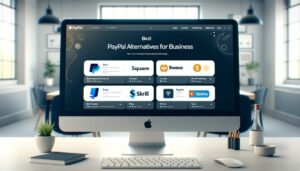Boost Your E-Commerce with Top Email Marketing Software in 2024
The e-commerce wave is surging, and email marketing remains a critical tool for businesses to connect with customers. Its effectiveness lies in its efficiency, direct approach, and affordability. But managing large subscriber lists and complex marketing demands can be challenging. Here’s where email marketing software steps in.
These platforms simplify and enhance your marketing efforts:
- Build and manage email lists: Easily gather and organize subscriber information.
- Gain customer insights: Leverage data analysis to understand user preferences.
- Personalize your marketing: Craft targeted campaigns that resonate with your audience.
- Design engaging emails: Utilize drag-and-drop editors and pre-built templates.
- Track and optimize: Analyze results to measure campaign performance and improve ROI.
With a vast array of options, choosing the right software can be daunting. We’ve compiled a list of 11 top contenders for e-commerce businesses in 2024, each offering unique features to cater to diverse needs.
Beyond Promotions: Building Customer Relationships
Email marketing goes beyond just pushing sales. Compelling content can build brand loyalty and awareness. Email marketing software empowers you to:
- Showcase brand value: Communicate your brand identity and mission effectively.
- Nurture customer relationships: Foster long-term connections through personalized interactions.
Cost-Effective Marketing Powerhouse
Compared to advertising or social media campaigns, email marketing is a budget-friendly option. You reach customers directly in their inboxes, eliminating additional promotion costs. Additionally, most software offers flexible pricing plans to match your business size.
Data-Driven Optimization for Success
Email marketing software empowers data-driven decision-making. By analyzing user feedback and key metrics like click-through and conversion rates, you can:
- Refine email content: Tailor your message for better engagement.
- Optimize marketing strategies: Make data-backed decisions to maximize results.
Customization: Your Brand, Your Way
From email templates and content editing to scheduling and frequency, most software allows for extensive customization. This flexibility ensures your campaigns align seamlessly with your brand image and marketing goals.
Up Next: Unveiling the Top E-commerce Email Marketing Software
We’ll delve deeper into each of the 11 software options, exploring their functionalities and highlighting their strengths. With the right tool in hand, you can unlock a new chapter of success in your e-commerce digital marketing journey.
1. Klaviyo: A Powerful Ecommerce-Centric Email Marketing Platform
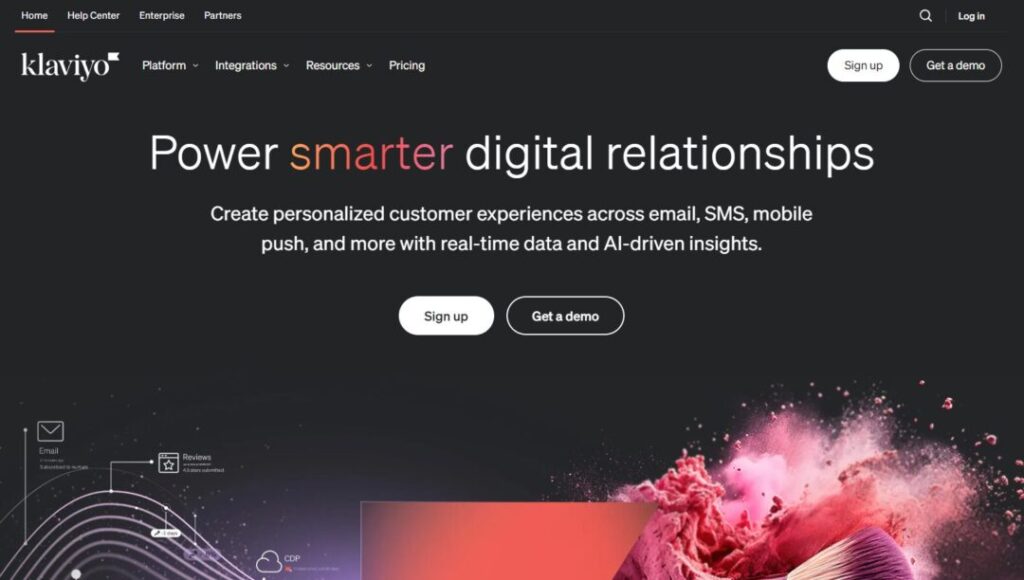
Klaviyo stands out as a top contender for the title of “Best Email Marketing Software for Ecommerce” due to its robust feature set designed specifically to help online stores drive sales and revenue through targeted email marketing campaigns. Here’s a deep dive into Klaviyo’s key features:
Seamless Ecommerce Integrations:
- Klaviyo integrates effortlessly with popular ecommerce platforms like Shopify, BigCommerce, WooCommerce, and Magento. This ensures real-time data sync of your product information, customer details, and purchase history, enabling highly personalized email experiences for your customers.
Advanced Segmentation & Targeting:
- Go beyond basic demographics. Segment your audience based on a wide range of purchase behavior criteria, including:
- Products purchased
- Purchase history
- Customer lifetime value (CLTV)
- Browsing behavior (abandoned carts, viewed products)
- Subscriber behavior (clicks, opens)
- This allows you to send highly relevant emails with personalized offers, product recommendations, and discount codes that resonate with each customer segment, maximizing engagement and conversions.
Powerful Automation Workflows:
- Craft intricate, multi-step automated email sequences triggered by specific customer actions or behaviors. This enables you to create highly personalized journeys for various ecommerce scenarios, including:
- Welcome Series: Warmly greet new subscribers and introduce them to your brand and products.
- Abandoned Cart Reminders: Nudge customers to complete their purchase with personalized reminders, including abandoned browse recovery emails.
- Win-Back Campaigns: Re-engage inactive customers with personalized offers to bring them back.
- Post-Purchase Follow-Ups: Thank customers, offer recommendations based on their purchase history, and encourage repeat business.
- Browse Abandonment Emails: Remind customers about products they viewed but didn’t buy.
- Highly Customized Workflows: Design intricate automation sequences tailored to specific customer segments and purchase behaviors.
Deep Customer Personalization:
- Personalization is a core strength of Klaviyo. Integrate customer data throughout your emails to personalize greetings, product recommendations, discount codes, abandoned cart reminders, win-back offers, and other content.
- Klaviyo offers features like dynamic content that automatically adjusts based on customer data, ensuring your emails feel relevant and engaging.
Additional Ecommerce-Specific Features:
- SMS Marketing (Paid Plans): Reach your customers on another channel with integrated SMS marketing capabilities. Send targeted text message campaigns to drive sales and promote special offers. (Available on paid plans)
- Product Recommendations AI: Klaviyo leverages AI to suggest relevant products to customers based on their purchase history and browsing behavior, increasing the likelihood of additional purchases.
- Webhooks & Custom Integrations: For advanced users, Klaviyo offers webhooks and custom integrations to connect with other tools and platforms in your ecommerce ecosystem.
Core Marketing Features:
- Drag-and-Drop Email Builder: Design visually appealing emails with ease using the user-friendly drag-and-drop builder. They offer a library of pre-built, mobile-optimized templates designed specifically for ecommerce marketing, and you can customize them with your branding and messaging.
- A/B Testing: Test different versions of your subject lines, content, and design elements to see what resonates best with your audience and optimize campaigns for maximum impact.
- Detailed Reporting & Analytics: Track key email marketing metrics such as open rates, click-through rates, conversion rates, and revenue generated. Klaviyo’s comprehensive reporting and analytics dashboard provides valuable insights into your campaign performance, allowing you to make data-driven decisions for improvement.
Considerations:
- Learning Curve: While Klaviyo is user-friendly, its advanced features might have a steeper learning curve compared to simpler email marketing platforms.
- Pricing: Klaviyo’s pricing is based on list size, which can be a consideration for businesses with a large subscriber base.
Overall, Klaviyo emerges as a powerful email marketing solution with a laser focus on helping ecommerce businesses drive sales and revenue growth. Its deep integrations with popular ecommerce platforms, advanced segmentation capabilities, AI-powered product recommendations, and robust automation features make it a valuable asset for online stores looking to maximize their email marketing ROI.
2. Mailchimp: A User-Friendly Option for Ecommerce Email Marketing
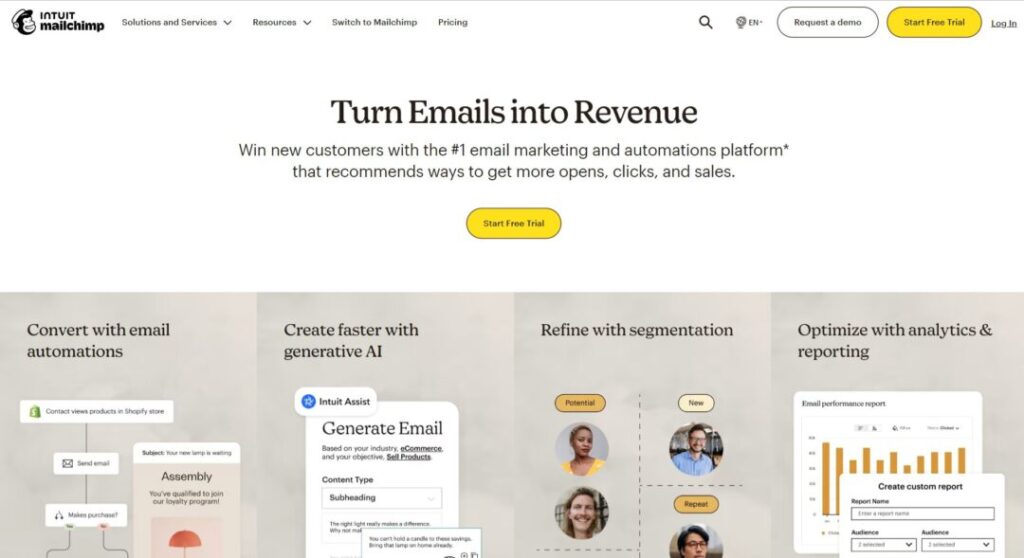
While not necessarily the absolute best for every ecommerce store, Mailchimp remains a popular choice due to its user-friendly interface, free plan (for a limited number of contacts), and well-established reputation. Here’s a closer look at Mailchimp’s features to see if it’s a good fit for your needs:
Core Email Marketing Features:
- Drag-and-Drop Email Builder: Mailchimp offers a user-friendly drag-and-drop builder that allows you to create visually appealing emails, even without coding knowledge. Pre-designed templates are available to get you started quickly.
- List Segmentation: Segment your email list based on demographics, purchase history, and other criteria to send targeted campaigns that resonate with specific customer groups.
- Marketing Automation: Set up automated email workflows for abandoned carts, welcome messages, and post-purchase follow-ups. While not as powerful as some competitors, Mailchimp’s automation features can still be helpful for basic nurturing sequences.
- Email Personalization: Personalize greetings, product recommendations, and other content within your emails using customer data.
- A/B Testing: Test different versions of your subject lines and content to see what performs best with your audience.
- Reporting & Analytics: Track key email marketing metrics such as open rates, click-through rates, and conversion rates to measure campaign performance.
Ecommerce-Specific Features (Available on paid plans):
- Product Recommendations: Recommend products to customers based on their purchase history and browsing behavior.
- Abandoned Cart Emails: Send automated emails to remind customers about items left behind in their cart.
- CRM Integration (Paid Add-on): Integrate Mailchimp with your ecommerce platform to connect customer data and enhance personalization.
Additional Features:
- Landing Pages: Create landing pages to capture leads and promote specific campaigns or products. (Paid plans)
- Website Builder: Build a basic website with Mailchimp’s website builder. (Paid plans)
- Integrations: Mailchimp integrates with a variety of marketing and business tools.
Limitations to Consider:
- Free Plan Limitations: The free plan restricts the number of contacts you can have (up to 500) and the number of emails you can send per month (up to 1,000).
- Automation Limitations: Automation features are not as robust as some competitors, making it less suitable for complex marketing workflows.
- Limited Ecommerce Functionality: Ecommerce-specific features are only available on paid plans, and even then, they may not be as advanced as those offered by platforms like Klaviyo.
Overall, Mailchimp is a good option for beginners or small businesses with a limited budget who are looking for a user-friendly platform to manage basic email marketing campaigns. However, if you have a growing ecommerce store and require advanced features like powerful automation, in-depth customer segmentation, and robust ecommerce integrations, you might outgrow Mailchimp’s capabilities and benefit from a more specialized platform.
3. Omnisend: A Feature-Rich Powerhouse for Ecommerce Email Marketing
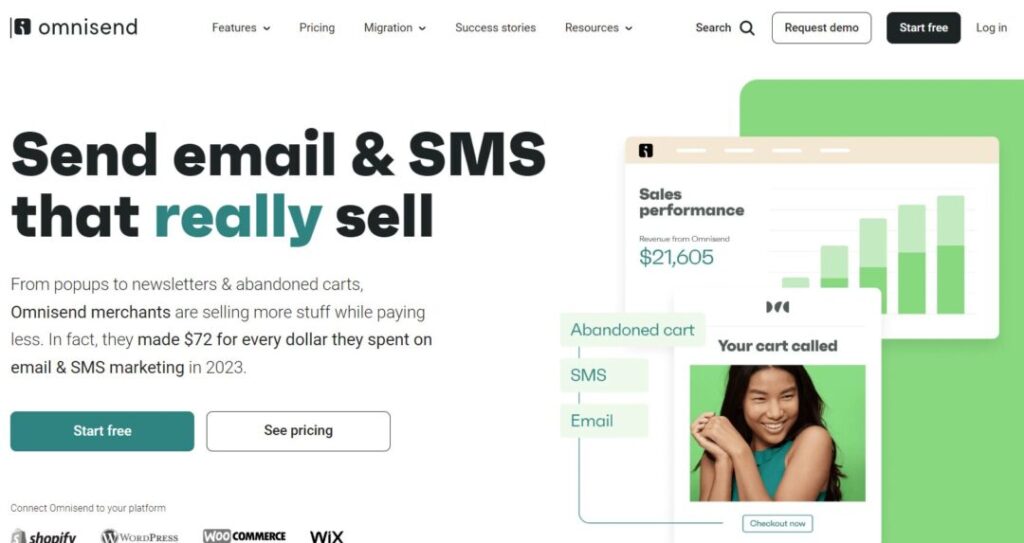
Omnisend is a top-tier email marketing platform designed specifically for eCommerce businesses. Known for its robust automation capabilities and multi-channel marketing options, Omnisend enables online retailers to create highly personalized and efficient marketing campaigns. Here’s an in-depth look at the key features that make Omnisend a standout choice for eCommerce:
Key Features of Omnisend:
- Seamless Ecommerce Integrations: Omnisend integrates effortlessly with popular ecommerce platforms like Shopify, Magento, WooCommerce, and BigCommerce. This ensures real-time data sync of your product information, customer details, and purchase history, enabling highly personalized email experiences.
- Drag-and-Drop Email Builder: Create visually stunning and responsive emails with ease using Omnisend’s user-friendly drag-and-drop builder. They offer a library of pre-built, mobile-optimized templates to jumpstart your campaigns, and you can customize them with your branding and messaging.
- Advanced Segmentation & Targeting: Go beyond basic demographics. Segment your audience based on a wide range of criteria, including purchase behavior, browsing activity, abandoned carts, product preferences, email engagement, and more. This allows you to send highly targeted emails with relevant content and offers that resonate with each customer segment, maximizing engagement and conversions.
- Powerful Automation Workflows: Craft automated email sequences triggered by specific customer actions or behaviors. Similar to Klaviyo, Omnisend offers a robust automation engine to create personalized email flows for:
- Welcome Series: Warmly greet new subscribers and introduce them to your brand and products.
- Abandoned Cart Reminders: Nudge customers to complete their purchase with timely reminders.
- Win-Back Campaigns: Re-engage inactive customers with personalized offers to bring them back.
- Post-Purchase Follow-Ups: Thank customers, offer recommendations, and encourage repeat business.
- Browse Abandonment Emails: Remind customers about products they viewed but didn’t buy.
- Deep Customer Personalization: Personalization is a core strength of Omnisend. Integrate customer data throughout your emails to personalize greetings, product recommendations, discount codes, abandoned cart reminders, and other content. This creates a one-on-one experience that fosters stronger customer relationships and increases engagement.
- SMS Marketing: Reach your customers on another channel with integrated SMS marketing capabilities. Send targeted text message campaigns to drive sales and promote special offers.
- Popups & Landing Pages: Design and deploy popups and landing pages to capture leads, promote specific campaigns, and grow your email list directly from your store.
- A/B Testing: Test different versions of your email subject lines, content, and design elements to see what resonates best with your audience and optimize campaigns for maximum impact.
- Detailed Reporting & Analytics: Track key email marketing metrics such as open rates, click-through rates, conversion rates, and revenue generated. Omnisend’s comprehensive reporting and analytics dashboard provides valuable insights into your campaign performance, allowing you to make data-driven decisions for improvement.
Beyond these core features, Omnisend offers additional functionalities to elevate your ecommerce marketing efforts:
- Customer Lifecycle Marketing: Manage customer interactions throughout their journey with your brand, fostering loyalty and repeat business.
- Web Push Notifications: Send targeted push notifications directly to your website visitors’ browsers to drive traffic and engagement.
- Prebuilt Workflows: Leverage pre-built workflows for common marketing scenarios to streamline campaign creation.
- Integrations: Omnisend integrates with a wide range of marketing and business tools, allowing you to streamline your workflow and connect your data across different platforms.
Overall, Omnisend positions itself as a comprehensive email marketing solution specifically designed for ecommerce businesses. Its robust features empower you to create highly targeted and personalized campaigns that drive sales, build customer relationships, and gain valuable insights to optimize your marketing strategies.
Here’s a bonus point to consider: Omnisend is often praised for being more affordable than some competitors, offering a potentially good value proposition for ecommerce businesses on a budget.
4. ActiveCampaign: An Automation Powerhouse for Ecommerce Email Marketing
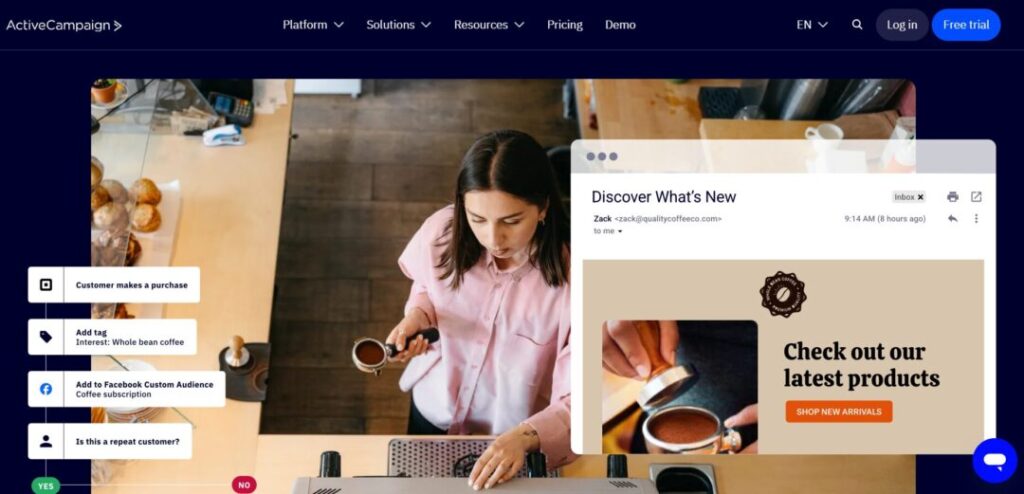
ActiveCampaign is one of the most robust and versatile email marketing platforms available, especially well-suited for eCommerce businesses. It combines powerful email marketing, automation, and CRM capabilities to help businesses engage with their customers more effectively and drive sales. Below, we delve into the key features that make ActiveCampaign stand out:
Key Features of ActiveCampaign:
- Seamless Ecommerce Integrations: ActiveCampaign integrates with popular ecommerce platforms like Shopify, Magento, and WooCommerce. This ensures your product data, customer information, and purchase history flow smoothly into the platform, enabling personalized campaigns.
- Drag-and-Drop Email Builder: Create visually appealing emails with ease using their user-friendly drag-and-drop builder. Pre-built templates are available to get you started, and you can customize them with your branding and messaging.
- Advanced Segmentation & Targeting: Segment your audience based on demographics, purchase behavior, browsing activity, abandoned carts, product preferences, email engagement, and more. This allows you to send highly targeted emails with relevant content and offers.
- Unmatched Automation Workflows: ActiveCampaign boasts one of the most powerful automation engines in the market. Craft complex, multi-step automated email sequences triggered by specific customer actions or behaviors. This enables you to create highly personalized journeys for various scenarios, including:
- Welcome Series: Warmly greet new subscribers and introduce them to your brand and products.
- Abandoned Cart Reminders: Nudge customers to complete their purchase with personalized reminders.
- Win-Back Campaigns: Re-engage inactive customers with personalized offers to bring them back.
- Post-Purchase Follow-Ups: Thank customers, offer recommendations based on their purchase history, and encourage repeat business.
- Browse Abandonment Emails: Remind customers about products they viewed but didn’t buy.
- Highly Customized Workflows: Design intricate automation sequences tailored to specific customer segments and behaviors.
- In-Depth Customer Personalization: Personalization is a major focus of ActiveCampaign. Integrate customer data throughout your emails to personalize greetings, product recommendations, discount codes, abandoned cart reminders, and other content. This creates a one-on-one experience that fosters stronger customer relationships and increases engagement.
- Conditional Content: Display specific content blocks within your emails based on customer data, allowing for hyper-personalized email experiences.
- SMS Marketing: Reach your customers on another channel with integrated SMS marketing capabilities.
- Landing Pages: Design and deploy landing pages to capture leads, promote specific campaigns, and grow your email list directly from your store.
- A/B Testing: Test different versions of your email subject lines, content, and design elements to see what resonates best with your audience and optimize campaigns for maximum impact.
- Detailed Reporting & Analytics: Track key email marketing metrics such as open rates, click-through rates, conversion rates, and revenue generated. ActiveCampaign’s robust reporting and analytics dashboard provides valuable insights into your campaign performance, allowing you to make data-driven decisions for improvement.
Additional Features to Consider:
- CRM Integration: Manage your customer relationships within ActiveCampaign, offering a more holistic view of your customer interactions.
- Website Tracking: Track website visitor behavior to gain insights into customer journeys and personalize future interactions.
- Integrations: ActiveCampaign integrates with a wide range of marketing and business tools, allowing you to streamline your workflow and connect your data across different platforms.
Things to Keep in Mind:
- Learning Curve: ActiveCampaign’s powerful automation features can have a steeper learning curve compared to some competitors.
- Pricing: ActiveCampaign’s pricing structure might be higher than some other options, particularly for smaller businesses.
Overall, ActiveCampaign provides a comprehensive and powerful email marketing solution tailored to meet the specific needs of eCommerce businesses. Its robust automation, CRM integration, advanced segmentation, and multi-channel marketing capabilities make it an ideal tool for online retailers aiming to optimize their marketing efforts and drive growth. Whether you are a small business or an established enterprise, ActiveCampaign equips you with the tools necessary to create highly personalized and effective marketing campaigns that boost customer engagement and increase sales.
5. GetResponse: A Versatile Option for Ecommerce Email Marketing
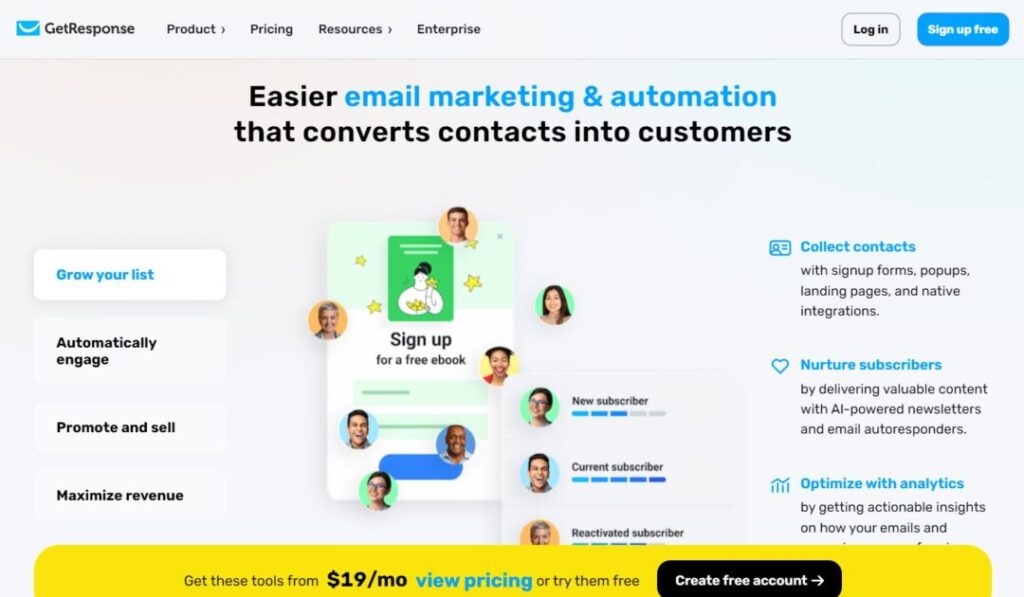
GetResponse is a versatile and comprehensive email marketing platform designed to meet the specific needs of eCommerce businesses. Known for its user-friendly interface and powerful features, GetResponse helps online retailers create engaging email campaigns, automate customer journeys, and drive sales effectively. Below is a detailed overview of the key features that make GetResponse a top choice:
Core Email Marketing Features:
- Drag-and-Drop Email Builder: Design visually appealing emails with ease using the user-friendly drag-and-drop builder. Pre-designed templates are available to get you started quickly.
- List Segmentation: Segment your email list based on demographics, purchase history, website behavior, and more. This allows you to send targeted emails with relevant content.
- Marketing Automation: Set up automated email workflows for abandoned carts, welcome messages, post-purchase follow-ups, and other scenarios. While not as intricate as some competitors, GetResponse’s automation features can still be helpful for basic nurturing sequences.
- Email Personalization: Personalize greetings, product recommendations, and other content within your emails using customer data.
- A/B Testing: Test different versions of your subject lines and content to see what performs best with your audience.
- Reporting & Analytics: Track key email marketing metrics such as open rates, click-through rates, and conversion rates to measure campaign performance.
Ecommerce-Specific Features:
- Product Recommendations: Recommend products to customers based on their purchase history and browsing behavior.
- Abandoned Cart Reminders: Send automated emails to remind customers about items left behind in their cart.
- Webinar Marketing: Host webinars to connect with your audience, promote products, and generate leads. (Paid plans)
- Landing Pages: Create landing pages to capture leads and promote specific campaigns or products. (Paid plans)
Additional Features:
- Sales Funnels: Design and build sales funnels to guide customers through your buying journey and increase conversions. (Paid plans)
- Webinars: Host webinars to connect with your audience, promote products, and generate leads. (Paid plans)
- Autofunnels: Combine landing pages, email marketing, and sales funnels into automated workflows. (Paid plans)
- CRM Integration: Manage your customer relationships within GetResponse, offering a more holistic view of your customer interactions. (Paid plans)
- Integrations: GetResponse integrates with a wide range of marketing and business tools.
Considerations:
- Free Plan Limitations: The free plan has significant limitations on the number of contacts you can have and the number of emails you can send per month.
- Ecommerce Features on Paid Plans: Ecommerce-specific features like product recommendations and abandoned cart emails are only available on paid plans.
- Focus on All-in-One Marketing: GetResponse might be a good fit if you’re looking for a comprehensive marketing platform that includes features beyond just email marketing. However, if your primary focus is on advanced email marketing functionalities for your ecommerce store, other options might be more suitable.
Overall, GetResponse is a powerful and comprehensive email marketing solution crafted to address the unique needs of eCommerce businesses. Its extensive features, which include advanced automation, robust segmentation, multi-channel marketing, and detailed analytics, make it an invaluable tool for online retailers aiming to optimize their marketing efforts and drive growth. Whether you are a small business or a large enterprise, GetResponse equips you with the necessary tools to create impactful, personalized marketing campaigns that engage customers and boost sales.
6. Constant Contact: A User-Friendly Option for Ecommerce Email Marketing
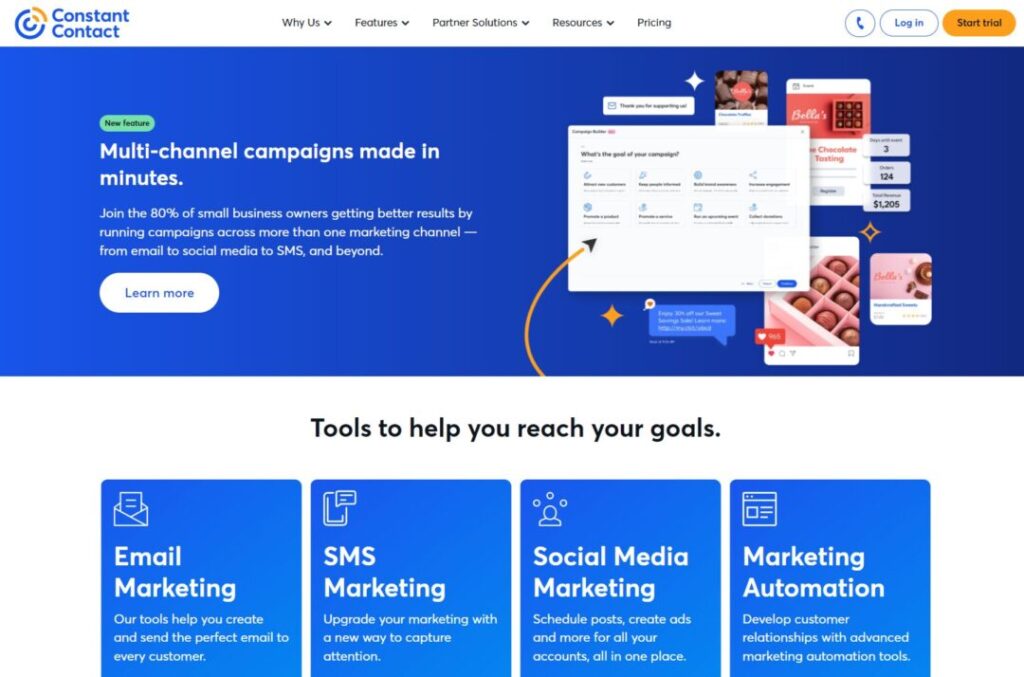
Constant Contact positions itself as a user-friendly email marketing platform that can cater to the needs of some ecommerce businesses. While it might not be the most feature-rich option on the market, it offers a good starting point for beginners with its ease of use and focus on customer support. Here’s a breakdown of Constant Contact’s key features:
Core Email Marketing Features:
- Drag-and-Drop Email Builder: Design visually appealing emails with ease using the user-friendly drag-and-drop builder. Pre-designed templates are available to get you started quickly.
- List Segmentation: Segment your email list based on basic demographics, email engagement, and signup forms. While segmentation capabilities may not be as advanced as some competitors, they can still be helpful for sending targeted campaigns.
- Email Automation: Set up basic automated email sequences for abandoned carts, welcome messages, and birthday greetings.
- Email Personalization: Personalize greetings and email content using basic customer data. Personalization options may be more limited compared to other platforms.
- A/B Testing: Test different versions of your subject lines to see what performs best with your audience.
Ecommerce-Specific Features:
- Simple Ecommerce Integrations: Integrate with basic ecommerce platforms like Shopify to sync some customer data. However, these integrations may not be as comprehensive as those offered by other email marketing software specifically designed for ecommerce.
- Email Marketing for Online Stores: Constant Contact offers resources and templates specifically tailored for online stores, but the functionality itself might be limited compared to competitors.
Additional Features:
- Event Marketing: Manage event registrations and send targeted emails to promote events.
- Surveys & Polls: Create surveys and polls to gather customer feedback.
- Reporting & Analytics: Track key email marketing metrics such as open rates, click-through rates, and conversion rates to measure campaign performance.
Considerations:
- Limited Automation & Segmentation: Automation and segmentation features might be less powerful compared to some competitors, making them less suitable for complex email marketing strategies.
- Limited Ecommerce Functionality: Ecommerce-specific features are more basic compared to platforms designed specifically for online stores.
- Focus on User-Friendliness: Constant Contact shines in its ease of use and customer support, making it a good option for beginners.
Overall, Constant Contact can be a user-friendly option for ecommerce businesses who are just starting out with email marketing and prioritize a simple platform with good customer support. However, if you require advanced features like powerful automation workflows, in-depth customer segmentation, and robust ecommerce integrations, other platforms might be a better fit.
7. Drip: Ecommerce-Focused Automation Powerhouse
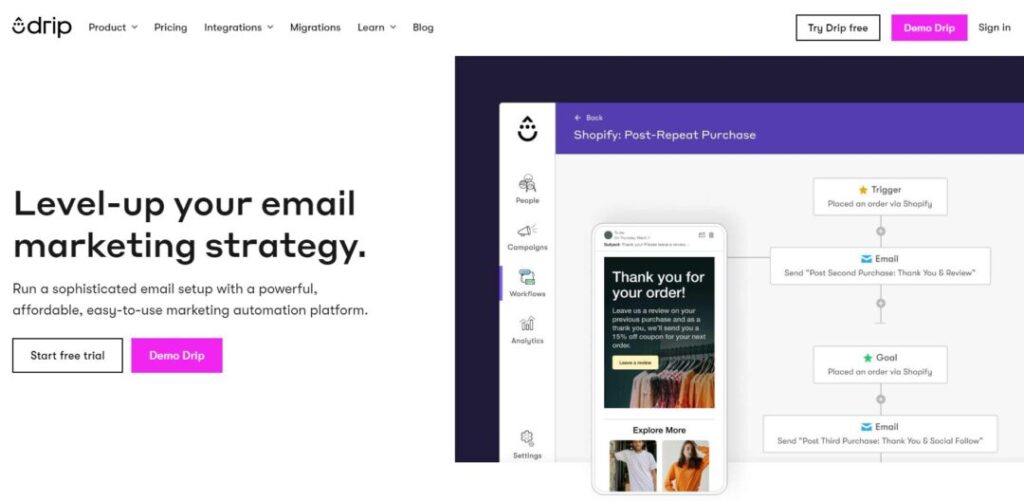
Drip is a powerful and specialized email marketing platform that caters specifically to the needs of eCommerce businesses. With its advanced marketing automation, robust segmentation capabilities, and deep eCommerce integrations, Drip helps online retailers create highly personalized customer experiences, drive engagement, and boost sales. Here’s a detailed look at its key features:
Key Features of Drip:
- Seamless Ecommerce Integrations: Drip integrates effortlessly with popular ecommerce platforms like Shopify, WooCommerce, and BigCommerce. This ensures real-time data sync of your product information, customer details, and purchase history, enabling highly personalized email experiences.
- Drag-and-Drop Email Builder: Create visually appealing emails with ease using Drip’s user-friendly drag-and-drop builder. They offer a library of pre-built, mobile-optimized templates to jumpstart your campaigns, and you can customize them with your branding and messaging.
- Advanced Customer Segmentation & Targeting: Segment your audience based on a wide range of purchase behavior criteria, including product categories purchased, purchase history, customer lifetime value (CLTV), and more. This hyper-targeting allows you to send highly relevant emails with personalized offers and recommendations that resonate with each customer segment, maximizing engagement and conversions.
- Powerful Automation Workflows: Drip excels in its automation capabilities. Craft intricate, multi-step automated email sequences triggered by specific customer actions or behaviors. This enables you to create highly personalized journeys for various scenarios, including:
- Welcome Series: Warmly greet new subscribers and introduce them to your brand and products.
- Abandoned Cart Reminders: Nudge customers to complete their purchase with personalized reminders. Drip offers advanced abandoned cart features like abandoned browse recovery emails and progressive discounts.
- Win-Back Campaigns: Re-engage inactive customers with personalized offers to bring them back.
- Post-Purchase Follow-Ups: Thank customers, offer recommendations based on their purchase history, and encourage repeat business.
- Browse Abandonment Emails: Remind customers about products they viewed but didn’t buy.
- Highly Customized Workflows: Design intricate automation sequences tailored to specific customer segments and purchase behaviors.
- Deep Customer Personalization: Personalization is a core strength of Drip. Integrate customer data throughout your emails to personalize greetings, product recommendations, discount codes, abandoned cart reminders, and other content. Drip offers specific features like dynamic content that automatically adjusts based on customer data.
- SMS Marketing (Paid Plans): Reach your customers on another channel with integrated SMS marketing capabilities. Send targeted text message campaigns to drive sales and promote special offers. (Available on higher-tier plans)
- A/B Testing: Test different versions of your email subject lines, content, and design elements to see what resonates best with your audience and optimize campaigns for maximum impact.
- Detailed Reporting & Analytics: Track key email marketing metrics such as open rates, click-through rates, conversion rates, and revenue generated. Drip’s comprehensive reporting and analytics dashboard provides valuable insights into your campaign performance, allowing you to make data-driven decisions for improvement.
Additional Features to Consider:
- Visual Workflow Builder: Drip’s visual workflow builder provides a user-friendly interface to design and manage your automated email sequences
- Customizable Email Opt-in Forms: Create custom opt-in forms to capture leads and grow your email list directly from your store.
- Integrations: Drip integrates with a wide range of marketing and business tools, allowing you to streamline your workflow and connect your data across different platforms.
Things to Keep in Mind:
- Ecommerce Focus: Drip is specifically designed for ecommerce businesses, and its features cater primarily to this niche. This can be a major advantage for online stores, but it might not be the best fit if you have broader marketing needs beyond ecommerce.
Overall, Drip emerges as a powerful email marketing solution laser-focused on helping ecommerce businesses drive sales through personalized automation workflows and targeted campaigns. Its deep integration with popular ecommerce platforms and advanced customer segmentation capabilities make it a valuable asset for online stores looking to maximize their email marketing ROI.
8. Brevo (Formerly Sendinblue): A Budget-Friendly Option for Ecommerce Email Marketing
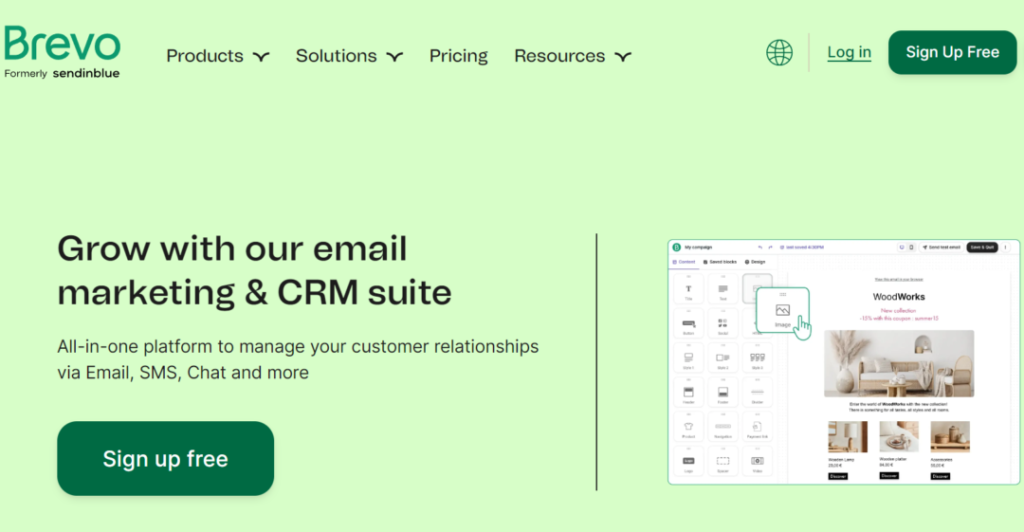
Brevo, previously known as Sendinblue, carves out a space as a budget-friendly email marketing platform with features that can cater to the needs of some ecommerce businesses. It offers a free plan with a generous contact limit, making it an attractive option for those starting out. Here’s a breakdown of Brevo’s key features:
Core Email Marketing Features:
- Drag-and-Drop Email Builder: Design visually appealing emails with ease using the user-friendly drag-and-drop builder. Pre-designed templates are available to get you started quickly.
- List Segmentation: Segment your email list based on demographics, email engagement, and other criteria. While segmentation capabilities may not be as advanced as some competitors, they can still be helpful for sending targeted campaigns.
- Marketing Automation: Set up basic automated email workflows for abandoned carts, welcome messages, and post-purchase follow-ups. Automation features may be less intricate compared to some competitors.
- Email Personalization: Personalize greetings and email content using basic customer data. Personalization options may be more limited compared to other platforms.
- A/B Testing: Test different versions of your subject lines to see what performs best with your audience.
Ecommerce-Specific Features (Paid Plans):
- Basic Ecommerce Integrations: Brevo integrates with some ecommerce platforms like Shopify. However, these integrations might not be as comprehensive as those offered by other email marketing software specifically designed for ecommerce.
- SMS Marketing (Paid Plans): Reach your customers on another channel with integrated SMS marketing capabilities. Send targeted text message campaigns to drive sales and promote special offers. (Available on paid plans)
- Transactional Emails (Paid Plans): Send automated transactional emails such as order confirmations, shipping notifications, and password resets. (Available on paid plans)
Additional Features:
- Landing Pages (Paid Plans): Create landing pages to capture leads and promote specific campaigns or products. (Available on paid plans)
- CRM (Paid Plans): Manage basic customer interactions within Brevo. (Available on paid plans)
- Website Tracking (Paid Plans): Track website visitor behavior to gain insights into customer journeys. (Available on paid plans)
- Integrations: Brevo integrates with a wide range of marketing and business tools.
Considerations:
- Limited Features on Free Plan: The free plan offers a generous contact limit but restricts some core functionalities, including marketing automation and transactional emails. Upgrading to a paid plan is necessary to access these features.
- Limited Ecommerce Functionality: Ecommerce-specific features are more basic compared to platforms designed specifically for online stores.
- Focus on Budget-Friendly Marketing: Brevo shines with its free plan and affordable paid tiers, making it a good option for those on a tight budget. However, if you require advanced features like powerful automation workflows or in-depth customer segmentation, other platforms might be a better fit.
Overall, Brevo (formerly Sendinblue) can be a budget-friendly option for ecommerce businesses who are just starting out with email marketing and prioritize a free plan with a generous contact limit. However, if you require more advanced features or deeper ecommerce integrations, other platforms might offer a better feature set for your needs.
9. SmartrMail: A Feature-Rich Option for Ecommerce Email Marketing
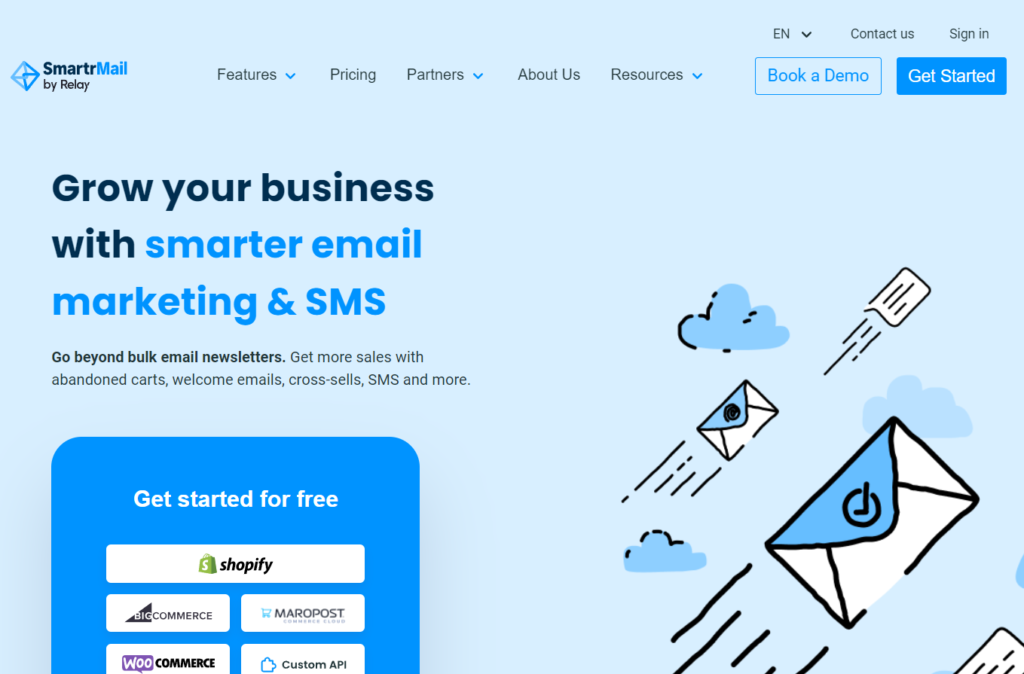
SmartrMail is a dedicated email marketing platform designed specifically for eCommerce businesses. Its focus is on simplicity, automation, and effective marketing strategies to help online retailers maximize their email marketing efforts. SmartrMail offers a variety of powerful tools and features to enhance customer engagement, increase sales, and drive business growth. Here’s a detailed look at its key features:
Key Features of SmartrMail:
- Seamless Ecommerce Integrations: SmartrMail integrates effortlessly with popular ecommerce platforms like Shopify, Magento, WooCommerce, and BigCommerce. This ensures real-time data sync of your product information, customer details, and purchase history, enabling highly personalized email experiences.
- Drag-and-Drop Email Builder: Create visually appealing emails with ease using SmartrMail’s user-friendly drag-and-drop builder. They offer a library of pre-built, mobile-optimized templates designed specifically for ecommerce marketing, and you can customize them with your branding and messaging.
- Advanced Segmentation & Targeting: Segment your audience based on a wide range of purchase behavior criteria, including product categories purchased, purchase history, customer lifetime value (CLTV), abandoned cart value, and more. This allows you to send highly relevant emails with personalized offers and recommendations that resonate with each customer segment, maximizing engagement and conversions.
- Powerful Automation Workflows: Craft intricate, multi-step automated email sequences triggered by specific customer actions or behaviors. This enables you to create highly personalized journeys for various ecommerce scenarios, including:
- Welcome Series: Warmly greet new subscribers and introduce them to your brand and products.
- Abandoned Cart Reminders: Nudge customers to complete their purchase with personalized reminders, including abandoned browse recovery emails.
- Win-Back Campaigns: Re-engage inactive customers with personalized offers to bring them back.
- Post-Purchase Follow-Ups: Thank customers, offer recommendations based on their purchase history, and encourage repeat business.
- Browse Abandonment Emails: Remind customers about products they viewed but didn’t buy.
- Win-back Campaigns: Re-engage inactive customers with personalized offers to bring them back.
- Deep Customer Personalization: Personalization is a core strength of SmartrMail. Integrate customer data throughout your emails to personalize greetings, product recommendations, discount codes, abandoned cart reminders, and other content.
- SMS Marketing (Paid Plans): Reach your customers on another channel with integrated SMS marketing capabilities. Send targeted text message campaigns to drive sales and promote special offers. (Available on paid plans)
- A/B Testing: Test different versions of your email subject lines, content, and design elements to see what resonates best with your audience and optimize campaigns for maximum impact.
- Detailed Reporting & Analytics: Track key email marketing metrics such as open rates, click-through rates, conversion rates, and revenue generated. SmartrMail’s robust reporting and analytics dashboard provides valuable insights into your campaign performance, allowing you to make data-driven decisions for improvement.
Additional Features to Consider:
- Product Recommendations AI: SmartrMail utilizes AI-powered product recommendations to suggest relevant products to customers based on their purchase history and browsing behavior.
- Popups & Personalized Opt-in Forms: Design and deploy popups and personalized opt-in forms to capture leads and grow your email list directly from your store.
- Exit-Intent Popups: Capture leads as visitors are about to leave your website with targeted exit-intent popups.
- Loyalty Programs (Paid Plans): Create and manage loyalty programs to reward repeat customers and encourage brand engagement. (Available on paid plans)
- Integrations: SmartrMail integrates with a wide range of marketing and business tools, allowing you to streamline your workflow and connect your data across different platforms.
Things to Keep in Mind:
- Ecommerce Focus: SmartrMail is specifically designed for ecommerce businesses, and its features cater primarily to this niche. This can be a major advantage for online stores, but it might not be the best fit if you have broader marketing needs beyond ecommerce.
Overall, SmartrMail emerges as a powerful email marketing solution with a strong focus on ecommerce functionality. Its deep integrations with popular ecommerce platforms, advanced segmentation capabilities, AI-powered product recommendations, and automation features designed for ecommerce scenarios make it a valuable asset for online stores looking to maximize their email marketing ROI.
10. Campaigner: A Solid Option for Ecommerce Email Marketing
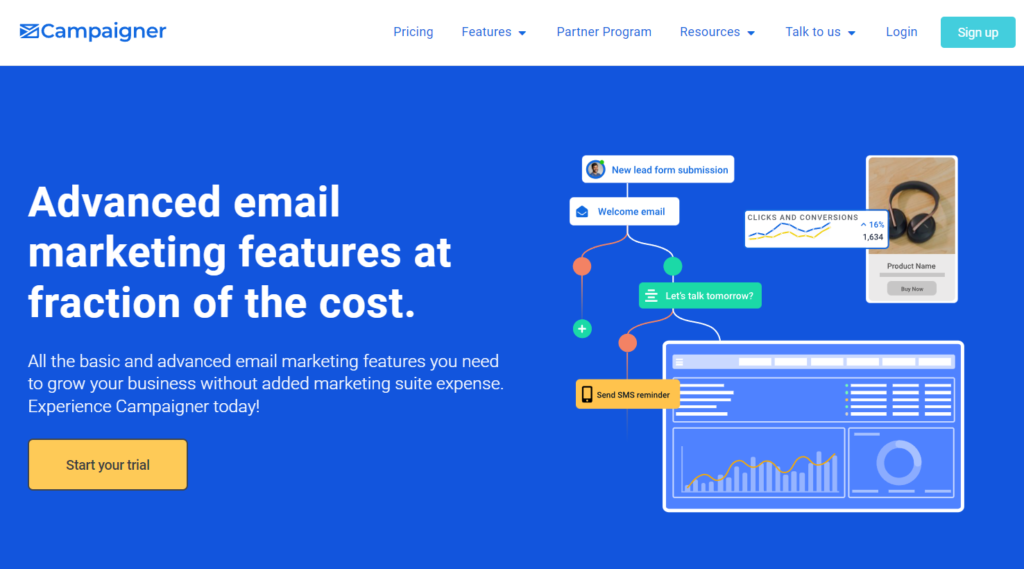
Campaigner establishes itself as a solid contender for managing email marketing for ecommerce businesses. While it might not be the most feature-rich option compared to some competitors, it offers a good balance of functionality, ease of use, and affordability. Here’s a closer look at Campaigner’s features in the context of ecommerce:
Ecommerce-Specific Features:
- Seamless Ecommerce Integrations: Campaigner integrates with popular ecommerce platforms like Shopify, BigCommerce, and WooCommerce. This integration allows for data sync of your product information, customer details, and purchase history, enabling you to personalize email campaigns based on customer behavior. (Integration capabilities might vary depending on the plan)
- Marketing Automation: Set up automated email workflows for abandoned carts, welcome messages, post-purchase follow-ups, and win-back campaigns. Campaigner offers a visual workflow builder to design these automated sequences.
- Segmentation & Targeting: Segment your audience based on demographics, purchase behavior (limited options compared to some competitors), and basic subscriber information. While segmentation capabilities might not be as advanced as some platforms, it allows for sending targeted campaigns based on purchase history or subscriber actions.
Core Marketing Features:
- Drag-and-Drop Email Builder: Design visually appealing emails with ease using the user-friendly drag-and-drop builder. Pre-designed templates are available to get you started quickly.
- Landing Pages (Paid Plans): Create landing pages to capture leads and promote specific campaigns or products. (Availability may depend on the plan)
- A/B Testing: Test different versions of your subject lines and content to see what performs best with your audience.
- Reporting & Analytics: Track key email marketing metrics such as open rates, click-through rates, and conversion rates to measure campaign performance.
Considerations:
- Limited Ecommerce Functionality Compared to Specialized Platforms: While Campaigner offers basic automation functionalities for common ecommerce scenarios, its features might be less comprehensive compared to platforms specifically designed for ecommerce email marketing, like Drip, Klaviyo, or Omnisend. These specialized platforms might offer more advanced segmentation options, personalization features, and ecommerce-specific workflows.
- Plan-Dependent Features: Some features like landing pages and advanced integrations might be limited to higher-tier plans.
Overall, Campaigner can be a good option for ecommerce businesses who are looking for:
- A user-friendly platform with a good balance of core email marketing features and basic ecommerce functionalities.
- An affordable solution, especially for smaller businesses.
However, for businesses with complex email marketing needs and a focus on advanced segmentation, in-depth customer personalization, and robust ecommerce workflows, other platforms might offer a better feature set specifically designed for online stores.
11. HubSpot Marketing Hub: A Feature-Rich Option for Ecommerce Email Marketing
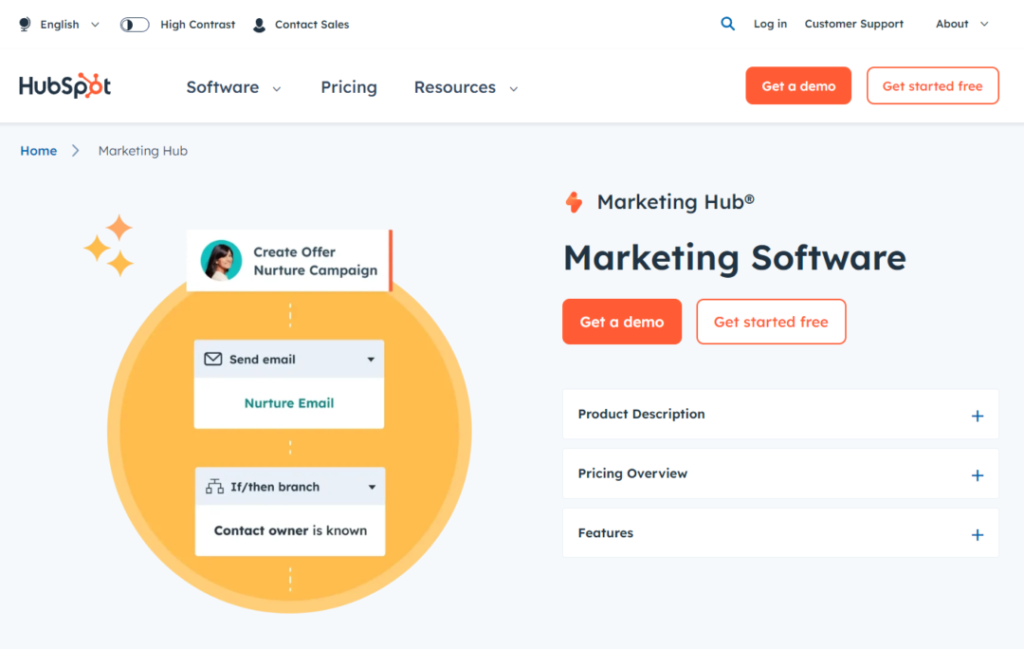
HubSpot Marketing Hub positions itself as a comprehensive marketing suite that can cater to the email marketing needs of ecommerce businesses. While it might not be as laser-focused on ecommerce as some competitors, it offers a robust set of features alongside other marketing tools within the same platform. Here’s a breakdown of HubSpot’s functionalities relevant to ecommerce email marketing:
Ecommerce Integrations:
- Seamless Integration with HubSpot CRM: HubSpot Marketing Hub integrates seamlessly with HubSpot’s CRM system, providing a centralized location for managing customer data, purchase history, and email marketing efforts.
- Connects with Popular Ecommerce Platforms: HubSpot integrates with major ecommerce platforms like Shopify, WooCommerce, and BigCommerce. This allows for data sync of product information, customer details, and purchase behavior for more targeted email marketing campaigns.
Email Marketing Features:
- Drag-and-Drop Email Builder: Design beautiful and responsive emails with ease using the user-friendly drag-and-drop builder. Pre-built templates specifically designed for ecommerce marketing are available.
- Segmentation & Targeting: Segment your audience based on demographics, purchase behavior (limited compared to Klaviyo or Drip), lifecycle stage, and website activity. This allows for sending targeted campaigns that resonate with different customer segments.
- Marketing Automation: Design automated email workflows triggered by specific customer actions or behaviors. HubSpot offers a visual workflow builder to create automated sequences for abandoned carts, welcome messages, post-purchase follow-ups, win-back campaigns, and more. While automation capabilities might be less intricate compared to some dedicated ecommerce platforms, they cater to core needs.
- Personalization: Personalize your email marketing with dynamic content that automatically adjusts based on customer data. This ensures your emails feel relevant and engaging, addressing customers by name, recommending products based on purchase history, and including personalized discount codes.
Additional Valuable Features:
- Landing Pages & Lead Capture Forms: Create landing pages and lead capture forms to grow your email list and promote specific campaigns or products.
- A/B Testing: Test different versions of your subject lines, content, and design elements to see what resonates best with your audience and optimize campaigns for maximum impact.
- CRM Integration: As mentioned earlier, the integration with HubSpot CRM allows you to leverage customer data for more targeted email marketing efforts and gain a holistic view of your customer journey.
- Reporting & Analytics: Track key email marketing metrics such as open rates, click-through rates, conversion rates, and revenue generated within the HubSpot platform. Gain valuable insights into your campaign performance and make data-driven decisions for improvement.
Considerations:
- Learning Curve: While HubSpot offers a user-friendly interface, its comprehensive suite of marketing tools might have a steeper learning curve compared to simpler email marketing platforms.
- Pricing: HubSpot Marketing Hub offers tiered pricing plans, and the cost can increase based on the number of contacts you have. For businesses with a large subscriber base, the cost might be a significant factor to consider.
- Ecommerce-Specific Features: While offering valuable functionalities, HubSpot’s email marketing features might be less comprehensive compared to platforms specifically designed for ecommerce, like Klaviyo or Drip. Advanced segmentation options based on in-depth purchase behavior and highly customized automation workflows might be limited.
Overall, HubSpot Marketing Hub can be a good option for:
- Ecommerce businesses already using the HubSpot CRM and looking for an integrated marketing suite that includes email marketing capabilities.
- Businesses that value a comprehensive marketing platform with features beyond just email marketing, such as landing pages, lead capture forms, and social media management tools.
- Businesses willing to invest time in learning a more comprehensive marketing platform.
However, for businesses solely focused on email marketing and prioritizing features like advanced ecommerce segmentation, AI-powered product recommendations, and intricately designed automation workflows, platforms like Klaviyo or Drip might be a better fit.
Conclusion: Choosing the Perfect Ecommerce Email Marketing Partner
The landscape of ecommerce email marketing software is vast and ever-evolving. Choosing the right platform depends on your specific needs and budget. Here’s a quick recap to guide your decision:
- For a platform built specifically for ecommerce with robust features and advanced automations: Consider Klaviyo, Drip, or Omnisend.
- For a user-friendly platform with core marketing functionalities and basic ecommerce integrations: Mailchimp, Constant Contact could be good options, especially for smaller businesses.
- For a comprehensive marketing suite with ecommerce capabilities: Explore HubSpot Marketing Hub.
Remember, the best way to find the perfect fit is to try out different platforms with free trials or demos. Experiment and see which platform offers the features, ease of use, and scalability to help your ecommerce business thrive.
Bonus Tip: Regardless of the platform you choose, remember that successful email marketing goes beyond the software itself. Focus on building a strong email list, segmenting your audience effectively, crafting compelling content, and personalizing your messages to drive engagement and sales.
By combining the power of the right email marketing software with strategic planning and high-quality content, you can transform your email marketing efforts into a significant revenue generator for your ecommerce business.



